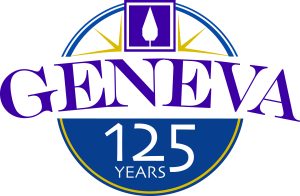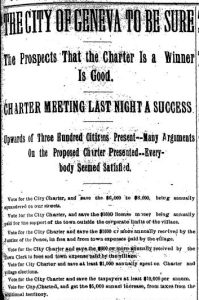Happy Birthday, City of Geneva
 Though 2023 marks the 125th anniversary of the city charter, Geneva has several milestones. Below is a brief overview of how Geneva has changed as a municipality.
Though 2023 marks the 125th anniversary of the city charter, Geneva has several milestones. Below is a brief overview of how Geneva has changed as a municipality.
Pre-1779
Geneva stands on the ancestral lands of the Onödowá’ga:’ or “the People of the Great Hill.” In English, they are known as the Seneca people. In the 1600s and 1700s the Seneca had several settlements near Geneva. The Seneca did not plan permanent settlements. Instead, a village would be moved every 10-50 years depending on how long the resources lasted. The settlements were Ganechstage (ca. 1688 – ca. 1715), New Ganechstage (ca. 1715-1754), and Kanadesaga (1754-1779).
In 1779 the Sullivan-Clinton Campaign destroyed numerous Haudenosaunee villages (including Kanadesaga) and burned acres of fields and orchards which forced the Haudenosaunee out of the area.
1793
Charles Williamson (land agent for what is now the Finger Lakes) engaged Joseph Annin to lay out the streets and building lots for Geneva. This survey remains the basic layout for South Main Street. Williamson was determined to establish the village on the hill above the lake and away from the “swampy” areas. The principal street was to be laid out on the crest of the ridge with building lots only on the west side and garden lots on the east side overlooking the lake.
By 1796, streets were opened, building lots were cleared and a commercial center developed around Pulteney Park. The frontage across from Hobart and William Smith Colleges (link), however, is the only area that still reflects Williamson’s original plan.
1806
The Village of Geneva was incorporated in 1806 and the act of incorporation was amended six years later. The village was governed by a Board of Trustees who selected a president, treasurer, clerk, tax collector, and fire wardens. By 1872 three wards were established for the election of village trustees. One ward lay south of Seneca Street, the second was the northwest part of the village, and the third was to the east of Genesee Street and north of downtown.
1898
By the mid-1890s local leaders felt the village charter no longer met the needs of the growing community. Roads needed paving, water and sewer systems were being improved, and there were more administrative duties. At the time, becoming a city in New York State was not based on size or population. All a community had to do was prove it wanted to incorporate as a city. In November 1896 the village Board of Trustee’s appointed a committee to draft a city charter for Geneva. After its presentation at a special tax meeting, the charter would go to eligible Geneva voters for approval. If accepted the charter would then go to the State Legislature.
Not everyone, however, was happy at the prospect of Geneva becoming a city. Some were concerned about how becoming a city would affect taxes. As a village, taxes had to be approved by village voters, while as a city, those same taxes only needed to be approved by the Common Council.
On February 2,1897 voters passed the charter by 173 votes (475 votes in favor and 302 against). The charter was sent to the State Legislature for approval. There was, however, only two months to get the charter passed as the 120th New York State Legislature would meet until April 24. Village officials pressured local representatives and in late April the Geneva City Charter was approved before the end of the legislative session.
Under the new charter Geneva was divided into six wards with a mayor-Common Council form of government. That fall an election was held for the new Common Council and the official charter went into effect on January 1, 1898.
1964
In 1964 Geneva changed to a city council-manager form of governance. A professional city manager oversees daily operations and finances and reports to City Council. The mayor is elected by all voters and serves as the head of the council. There are six councilors elected from each ward of the city and two at-large members. The mayor chairs monthly council meetings with reports from the city manager and counsel from the city attorney.
For more about local government see the exhibit Two Genevas.
To celebrate the 125th anniversary a variety of activities are planned for the week of February 26.


Very informative and answers a lot of historical questions I had.
Well done. Geneva’s history in a nutshell.